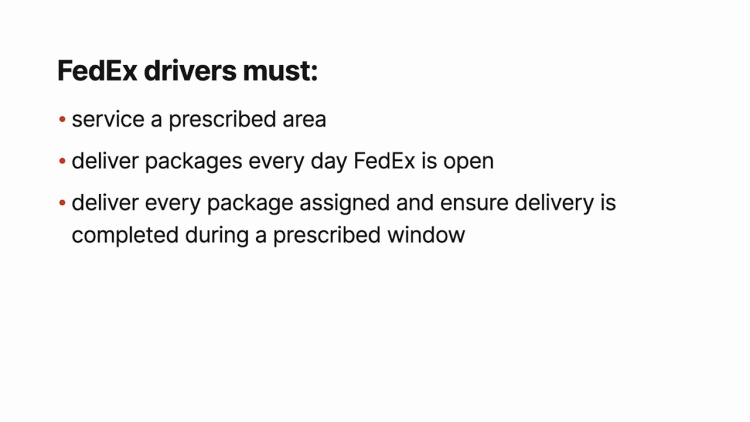Alexander v. FedEx Ground Package System, Inc.
United States Court of Appeals for the Ninth Circuit
765 F.3d 981 (2014)

- Written by Sean Carroll, JD
Facts
FedEx Ground Package System, Inc. (defendant) classified its delivery drivers as independent contractors. FedEx signed an operating agreement with each driver that governed the parties’ relationship. Generally, the agreement stated the parties' business goals and said that “the manner and means of reaching” those goals were within the driver’s discretion. FedEx gave drivers enough work to fill between 9.5 and 11 hours per day, but FedEx did not prescribe specific schedules as long as the packages were delivered within delivery windows specified by customers. FedEx instructed drivers to take delivery routes that would minimize time and expense and maximize profit, but Fed Ex did not prescribe specific delivery routes. FedEx also required drivers to meet FedEx’s customer-service standards and permitted managers to conduct ride-along evaluations to monitor drivers' performance and take notes on service details, including details as small as how a driver holds his or her keys after locking the vehicle. FedEx required drivers to use their own vehicles but specified that the vehicles had to be painted "FedEx white," contain the FedEx logo, and meet certain other FedEx specifications. Drivers were required to pay for the maintenance of their vehicles. FedEx provided drivers with a uniform and scanners necessary to complete deliveries, but deducted the costs of that equipment from drivers’ pay. Finally, drivers were required to meet appearance and grooming requirements. Dean Alexander and a class of fellow FedEx drivers (plaintiffs) sued FedEx in California state court asserting that they were FedEx's employees and not independent contractors. FedEx removed the action to federal court. After drivers brought similar cases in 40 other states, the cases were consolidated in a federal multidistrict litigation (MDL). The MDL court granted FedEx's summary-judgment motion on the employment-status issue, concluding as a matter of law that the drivers were independent contractors. The MDL court remanded Alexander's class action back to the California federal district court to resolve the plaintiffs' remaining claims. After final judgment was entered, Alexander appealed to the Ninth Circuit, challenging the MDL court's employment-status decision.
Rule of Law
Issue
Holding and Reasoning (Fletcher, J.)
What to do next…
Here's why 907,000 law students have relied on our case briefs:
- Written by law professors and practitioners, not other law students. 47,100 briefs, keyed to 996 casebooks. Top-notch customer support.
- The right amount of information, includes the facts, issues, rule of law, holding and reasoning, and any concurrences and dissents.
- Access in your classes, works on your mobile and tablet. Massive library of related video lessons and high quality multiple-choice questions.
- Easy to use, uniform format for every case brief. Written in plain English, not in legalese. Our briefs summarize and simplify; they don’t just repeat the court’s language.





